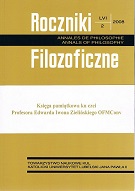Z dziejów nauczania filozofii w polskiej prowincji kapucynów w XIX wieku
On the History of Teaching Philosophy in the Polish Capuchin Province in the 19th Century
Author(s): Roland PrejsSubject(s): Philosophy
Published by: Towarzystwo Naukowe KUL & Katolicki Uniwersytet Lubelski Jana Pawła II
Keywords: capuchins; Scotism; Herman Osterrieder; kapucyni; szkotyzm; Herman Osterrieder
Summary/Abstract: The tsarist authorities dissolved the majority of monasteries in the Kingdom of Poland in 1864. This was one element of repression after the fall of the 1863 uprising. Those monasteries that remained could not enrol noviciates. The repression fell also on capuchins. In 1897 they were allowed, as an exception, to have one noviciate, namely Izydor Wysłouch who received his religious name Antoni. Accordingly, there was a need to educate the candidate in philosophy and theology, so that he could receive the priesthood. On the basis of correspondence between Bl. Honorat Koźmiński and the general we may say what textbooks were used in the Polish Capuchin Province. Before 1864 they studied philosophy from the book “Prolegomena universae philosophiae” written by the Franciscan Herman Osterrieder (1719-1783), to be precise course books and compendia based on this book. This textbook was principally eclectic in character, it contained some Scotist trends, therefore one may presume that before 1864 Scotism was to a certain degree present in the teaching of philosophy among Polish capuchins.
Journal: Roczniki Filozoficzne
- Issue Year: 56/2008
- Issue No: 2
- Page Range: 225-231
- Page Count: 7
- Language: Polish

